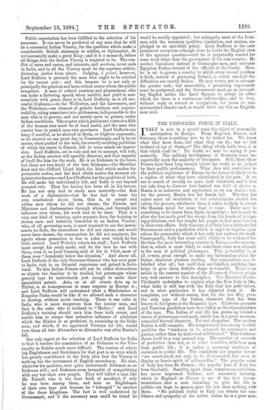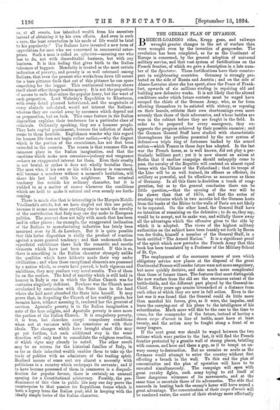THE UNNOTICED FORCE IN ITALY.
ITALY is now in a special sense the object of reasonable anticipation in Europe. From England, France, and Germany there is nothing new to be looked for. We know what they have done, and what they can do ; but we feel inclined to say of them,—" The thing which hath been, it is that which shall be." No doubt, we may be saying it pre-
maturely. The military development of Germany came un- expectedly upon the majority of foreigners. Still, these three Powers have been long enough before the world to be judged by their public performances. What they will contribute to the political experience of Europe in the future is likely to be a replica of what they have contributed in the past. If we are in search of novelty we must look elsewhere, and it does not take long to discover how limited our field of choice is.
Russia is as unknown and mysterious as we can desire ; but, for the present, Russia has her hands full. Whether her rulers stave off revolution, or her revolutionists abolish her rulers, the process, whichever form it takes, is likely to absorb the Russian mind for some time to come. There may be
something to be learnt from Spain by-and-bye ; but it must be after she has made good her escape from the hands of intrigu- ing politicians, and has taught her people to feel some interest in their own affairs. Italy remains, and Italy has a fairly-settled Government and a population which is eager to impress upon others the personality which it has only just realised for itself. Consequently, Italy has some solid claims to be reckoned for the time the most interesting country in Europe,—the country, that is, which is most likely to contribute some new element to the sum of political phenomena. This probability is, at all events, great enough to make any information about the Italian character pleasant reading. Our expectations may be falsified after all ; but until they are falsified, anything that helps to give them definite shape is valuable. There is an article in the current number of the Nineteenth Century which very well answers to this description. The Marchese Nobili- Vitelleschi undertakes to explain what the New Italy is like, what links it still has with the Italy that has gohe before, and in what particulars it has departed from it. He complains, not without reason, that for the last fifty years the only type of the Italian character that has been known to foreigners is the Romantic type. Calabrian peasants and Venetian gondoliers have been taken as the representatives of the race. The Italian of real life has grown up behind a screen of picturesque sentiment, which has, in a great measure, concealed his real character. Yet not altogether. The modern Italian is still romantic. His temperament has among its chief qualities the "tendency to be actuated by sentiments and passion rather than by motives of self-interest." This tendency shows itself in a very unusual way. The practice of counsels of perfection does not, as in other countries, withdraw men from public life ; it is rather a necessary condition of eminence in public life. The candidates for popular favour "are constrained, not only to be disinterested, but even to display an heroic spirit of self-sacrifice." The popular saint of Italy has been St. Francis ; the popular hero of Italy has been Garibaldi. Sanctity, apart from conspicuous asceticism, has never impressed Italians ; and successful industry, which- in England or France is one of the best recom- mendations. that a man intending to give his life to politics can hope to possess, goes for less than nothing with them. "No political leader in Italy can obtain the con- fidence and sympathy of the nation unless he is a poor man, or, at all events, has inherited wealth from his ancestors instead of obtaining it by his own efforts. And even in such a case, the least ostentation in his mode of life would be fatal to his popularity." The Italians have invented a new term of opprobrium for men who are concerned in commercial enter- prises. Such a man is called an (Turista—meaning one who has to do, not with discreditable business, but with any business. It is this feeling that gives birth to the Italian tolerance of beggars. Mendicity is treated as the most certain indication of poverty, and poverty is so well esteemed among Italians, that even the peasant who works from dawn till sunset for a bare pittance finds that out of this pittance he can spare something for the beggar. This sentimental tendency shows itself about other things besides money. It is not the proportion of means to ends that seizes the popular fancy, but the want of such proportion. Lord Wolseley's Expedition to Khartoum, with every detail planned beforehand, and the magnitude of every obstacle calculated, would not interest the Italians ; whereas they are carried away by successes which depend not on preparation, but on luck. This same feature in the Italian disposition explains their tenderness for a particular class of criminals. Ordinarily speaking, they are a humane people. They hate capital punishment, because the infliction of death seems to them horrible. Englishmen wonder why this regard for human life does not begin rather earlier,—why the disgust which is the portion of the executioner, has not first been extended to the assassin. The reason is that romance fills an immense place in the Italian imagination, and that the emotions which make men assassins—jealousy and vengeance —have an exaggerated interest for them. Even their cruelty is not brutal, or rather it does not wholly brutalise them. The man who, if his own or his wife's honour is concerned, will become a murderer without a moment's hesitation, will share his last loaf with his neighbour. The criminal tendency lies outside his ordinary character, but it is yielded to as a matter of course whenever the conditions which are held to make it natural and even seemly are forth- coming.
There is much else that is interesting in the Marquis Nobili- Vitelleschi's article, but we have singled out this one point, because it seems more than anything else to mark the novelty of the contribution that Italy may one day make to European polities. The account does not tally with much that has been said in other places ; for example, the exaggerated inclination of the Italians to manufacturing industries has lately been mourned over by M. de Laveleye. But it is quite possible that this latter disposition is really the product of reaction against a more general tendency ; and that underneath these superficial exhibitions there lurk the romantic and ascetic elements which have just been enumerated. If this is so, there is something in the Italian character strangely unlike the qualities which have hitherto made their way under civilisation ; and when these exceptional elements are possessed by a nation which, as events have proved, is both vigorous and ambitious, they may produce very novel results. Two of these lie on the surface. The kind of sanctity which is still held in honour in Italy is one in which the Italian Church was for centuries singularly deficient. Nowhere was the Church more secularised by association with the State than in the land where she had most absorbed the State into herself. It may prove that, in despoiling the Church of her worldly goods, her enemies have, without meaning it, rendered her the greatest of services. Apostolic poverty is to the Italian imagination a note of the true religion, and Apostolic poverty is once more the portion of the Italian Church. It is compulsory poverty, it is true, but churches accept compulsory conditions when not at variance with the conscience or with their ideals. The changes which have brought about this may go yet further, but each additional step in the same direction will only tend to consolidate the religious reaction, of which signs may already be noted. The other result may be an esteem for the historical families of Italy, in so far as their inherited wealth enables them to take up the trade of politics with no admixture of the trading spirit. Realised means of some sort are almost a necessity with politicians in a country which underpays its servants ; and if to have become possessed of them in commerce is a disquali- fication for popular favour, there is certainly an unusual opening for a Constitutional aristocracy. Possibly, the pre- dominance of this class in public life may one day prove the counterpoise to that passion for Republican forms which is both a legacy from the Italian past, and in keeping with the ideally simple tastes of the Italian character.



































 Previous page
Previous page